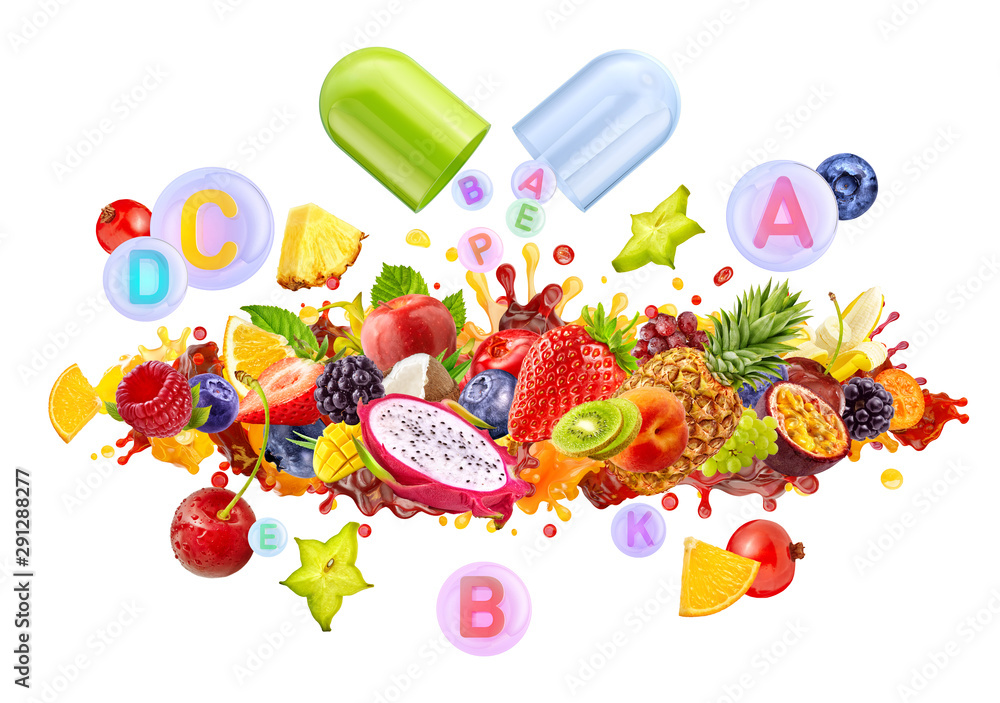Understanding Vitamins:
Vitamins: Your Essential Guide to Health
 Last updated: June 14, 2025
Last updated: June 14, 2025
Vitamins are essential nutrients that your body needs in small amounts to function properly and maintain overall health. From supporting immunity to enhancing vision and skin health, each vitamin plays a unique and crucial role. This comprehensive guide will help you understand different types of vitamins, their benefits, food sources, and deficiency symptoms—so you can make smarter health choices every day.
Types of Vitamins
Vitamins are broadly categorized into two groups:
- Fat-soluble vitamins: A, D, E, and K
- Water-soluble vitamins: B-complex and C
Fat-Soluble Vitamins
Vitamin A
- Benefits: Supports vision, immune health, and cell growth (NIH)
- Sources: Carrots, sweet potatoes, spinach, liver
- Deficiency symptoms: Night blindness, dry eyes, skin issues
Vitamin D
- Benefits: Helps in calcium absorption, bone health, and immune function (Healthline)
- Sources: Sunlight, fortified milk, egg yolks, fish liver oil
- Deficiency symptoms: Weak bones, fatigue, mood changes
Vitamin E
- Benefits: Acts as an antioxidant, protects skin and eyes (Medical News Today)
- Sources: Nuts, seeds, vegetable oils, green leafy vegetables
- Deficiency symptoms: Muscle weakness, vision problems
Vitamin K
- Benefits: Essential for blood clotting and bone strength (Cleveland Clinic)
- Sources: Kale, broccoli, spinach, fermented foods
- Deficiency symptoms: Bleeding gums, slow-healing wounds
Water-Soluble Vitamins
Vitamin C
- Benefits: Boosts immunity, aids collagen production, enhances iron absorption (Harvard)
- Sources: Oranges, strawberries, bell peppers, guava
- Deficiency symptoms: Bleeding gums, fatigue, slow wound healing
B-Complex Vitamins
The B group consists of eight water-soluble vitamins. Each has unique benefits (Medical News Today):
- B1 (Thiamine): Supports energy metabolism—found in whole grains, nuts
- B2 (Riboflavin): Maintains skin and eye health—in eggs, dairy, green veggies
- B3 (Niacin): Improves cholesterol and brain health—in poultry, peanuts
- B5 (Pantothenic Acid): Supports hormone production—in avocados, mushrooms
- B6 (Pyridoxine): Helps brain function and red blood cells—in bananas, potatoes
- B7 (Biotin): Promotes hair, skin, and nails—in egg yolks, soybeans
- B9 (Folate): Crucial for pregnant women—in lentils, dark leafy greens
- B12 (Cobalamin): Supports nerve function and red blood cell formation—in fish, meat, dairy
Why You Shouldn't Ignore Vitamin Deficiencies
Ignoring vitamin deficiencies can lead to serious health issues over time. Common problems include anemia (resulting from a lack of B12 or iron), a poor immune response (caused by vitamin C deficiency), and brittle bones (attributed to low vitamin D levels). Learn more about common vitamin deficiency symptoms.
Tips for Getting Enough Vitamins
- Eat a balanced diet with colorful fruits and vegetables
- Choose whole grains and lean proteins
- Spend some time in sunlight for natural vitamin D
- Consider a multivitamin supplement if recommended by a healthcare provider
Final Thoughts
Vitamins may be needed in small amounts, but they have a massive impact on your health. Understanding their benefits and making informed dietary choices can help you maintain energy, boost immunity, enhance mental sharpness, and achieve a glowing appearance.
Disclaimer: This content is for informational purposes only and is not a substitute for professional medical advice. Always consult a healthcare provider before taking any supplements.
Author: Mrs. Majid—a passionate health blogger dedicated to sharing evidence-based wellness tips and practical nutrition advice.
Join the conversation